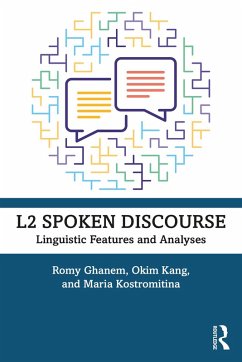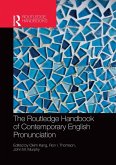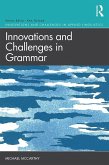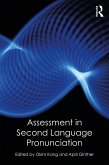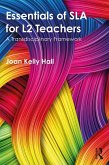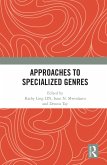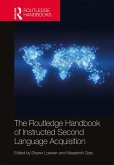Romy Ghanem, Okim Kang, Maria Kostromitina
L2 Spoken Discourse (eBook, ePUB)
Linguistic Features and Analyses
38,95 €
38,95 €
inkl. MwSt.
Sofort per Download lieferbar

19 °P sammeln
38,95 €
Als Download kaufen

38,95 €
inkl. MwSt.
Sofort per Download lieferbar

19 °P sammeln
Jetzt verschenken
Alle Infos zum eBook verschenken
38,95 €
inkl. MwSt.
Sofort per Download lieferbar
Alle Infos zum eBook verschenken

19 °P sammeln
Romy Ghanem, Okim Kang, Maria Kostromitina
L2 Spoken Discourse (eBook, ePUB)
Linguistic Features and Analyses
- Format: ePub
- Merkliste
- Auf die Merkliste
- Bewerten Bewerten
- Teilen
- Produkt teilen
- Produkterinnerung
- Produkterinnerung

Bitte loggen Sie sich zunächst in Ihr Kundenkonto ein oder registrieren Sie sich bei
bücher.de, um das eBook-Abo tolino select nutzen zu können.
Hier können Sie sich einloggen
Hier können Sie sich einloggen
Sie sind bereits eingeloggt. Klicken Sie auf 2. tolino select Abo, um fortzufahren.

Bitte loggen Sie sich zunächst in Ihr Kundenkonto ein oder registrieren Sie sich bei bücher.de, um das eBook-Abo tolino select nutzen zu können.
This book integrates theoretical and practical perspectives on computer-assisted analysis of spoken discourse, reflecting recent important developments in speech analysis for language teaching and assessment.
- Geräte: eReader
- ohne Kopierschutz
- eBook Hilfe
- Größe: 26.46MB
Andere Kunden interessierten sich auch für
![The Routledge Handbook of Contemporary English Pronunciation (eBook, ePUB) The Routledge Handbook of Contemporary English Pronunciation (eBook, ePUB)]() The Routledge Handbook of Contemporary English Pronunciation (eBook, ePUB)44,95 €
The Routledge Handbook of Contemporary English Pronunciation (eBook, ePUB)44,95 €![Innovations and Challenges in Grammar (eBook, ePUB) Innovations and Challenges in Grammar (eBook, ePUB)]() Michael MccarthyInnovations and Challenges in Grammar (eBook, ePUB)37,95 €
Michael MccarthyInnovations and Challenges in Grammar (eBook, ePUB)37,95 €![Assessment in Second Language Pronunciation (eBook, ePUB) Assessment in Second Language Pronunciation (eBook, ePUB)]() Assessment in Second Language Pronunciation (eBook, ePUB)37,95 €
Assessment in Second Language Pronunciation (eBook, ePUB)37,95 €![Essentials of SLA for L2 Teachers (eBook, ePUB) Essentials of SLA for L2 Teachers (eBook, ePUB)]() Joan Kelly HallEssentials of SLA for L2 Teachers (eBook, ePUB)40,95 €
Joan Kelly HallEssentials of SLA for L2 Teachers (eBook, ePUB)40,95 €![Communicative Spaces in Bilingual Contexts (eBook, ePUB) Communicative Spaces in Bilingual Contexts (eBook, ePUB)]() Communicative Spaces in Bilingual Contexts (eBook, ePUB)40,95 €
Communicative Spaces in Bilingual Contexts (eBook, ePUB)40,95 €![Approaches to Specialized Genres (eBook, ePUB) Approaches to Specialized Genres (eBook, ePUB)]() Approaches to Specialized Genres (eBook, ePUB)40,95 €
Approaches to Specialized Genres (eBook, ePUB)40,95 €![The Routledge Handbook of Instructed Second Language Acquisition (eBook, ePUB) The Routledge Handbook of Instructed Second Language Acquisition (eBook, ePUB)]() The Routledge Handbook of Instructed Second Language Acquisition (eBook, ePUB)48,95 €
The Routledge Handbook of Instructed Second Language Acquisition (eBook, ePUB)48,95 €-
-
-
This book integrates theoretical and practical perspectives on computer-assisted analysis of spoken discourse, reflecting recent important developments in speech analysis for language teaching and assessment.
Dieser Download kann aus rechtlichen Gründen nur mit Rechnungsadresse in A, B, BG, CY, CZ, D, DK, EW, E, FIN, F, GR, HR, H, IRL, I, LT, L, LR, M, NL, PL, P, R, S, SLO, SK ausgeliefert werden.
Produktdetails
- Produktdetails
- Verlag: Taylor & Francis
- Seitenzahl: 282
- Erscheinungstermin: 22. Dezember 2023
- Englisch
- ISBN-13: 9780429638800
- Artikelnr.: 69353609
- Verlag: Taylor & Francis
- Seitenzahl: 282
- Erscheinungstermin: 22. Dezember 2023
- Englisch
- ISBN-13: 9780429638800
- Artikelnr.: 69353609
Romy Ghanem serves as the Senior Researcher and Curriculum Director of the International Interfaith Research Lab at Teachers College, Columbia University. Her research areas include second language (L2) pronunciation, linguistic and reverse linguistic stereotyping, language profiling, and L2 speaker accentedness.
Okim Kang is Professor of Applied Linguistics and Director of the Applied Linguistics Speech Lab at Northern Arizona University. Her research interests are speech perception/production, language social psychology/attitudes, L2 pronunciation/intelligibility, L2 oral assessment/testing, and automated scoring/speech recognition.
Maria (Masha) Kostromitina received her Ph.D. in Applied Linguistics from Northern Arizona University. Her research interests lie in the intersection of second language prosody and pragmatics. Specifically, Masha investigates the effectiveness of pragma-prosodic training in improving learners' use of prosody in speech acts and the role of cognitive individual differences in prosody acquisition.
Okim Kang is Professor of Applied Linguistics and Director of the Applied Linguistics Speech Lab at Northern Arizona University. Her research interests are speech perception/production, language social psychology/attitudes, L2 pronunciation/intelligibility, L2 oral assessment/testing, and automated scoring/speech recognition.
Maria (Masha) Kostromitina received her Ph.D. in Applied Linguistics from Northern Arizona University. Her research interests lie in the intersection of second language prosody and pragmatics. Specifically, Masha investigates the effectiveness of pragma-prosodic training in improving learners' use of prosody in speech acts and the role of cognitive individual differences in prosody acquisition.
List of illustrations
Chapter 1Introdution
1.1 Why Spoken Language?
1.2 Spoken Language in the Fields of Linguistics and Applied Linguistics
1.3 L1 Spoken Discourse
1.4 L2 Spoken Discourse
1.5 Scope of the Book
References
Chapter 2
Considerations in the Dwescription and Analysis of L2 Spoken Discourse
Section A: Considerations for Researchers
2.1 Introduction
2.2 Theoretical Considerations for the Analysis of L2 Spoken Discourse
2.3 Corpus Linguistics Methods of Analysis of L2 Spoken Discourse
2.4 Data Sources
2.5 Units of Analysis in L2 Spoken Discourse
2.6 Methods of Acoustic and Temporal Analyses of L2 Spoken Discourse
2.7 Challenges in Describing and Analyzing L2 Spoken Discourse
Section B: Considerations for Teachers
2.8 Historical Development of L2 Pronunciation in the Classroom
2.9 Representation of Speech-Related Features in the L2 Classroom
2.10 L2 Speech and Language Assessment
References
Chapter 3
Segmental Features
Section A: Definitions and Research Findings
3.1 Introduction
3.2 Consonant Features
3.3 Vowel Features
3.4 The English Syllable
Section B: Extraction and Analysis
3.5 Consonant Features
3.6 Vowel Features
3.7 Syllable Features
Section C: Pedagogical Applications
3.8 Consonant Features
3.9 Vowel Features
References
Chapter 4
Suprasegmental FeaturesSection A: Definitions and Research Findings
4.1 Introduction4.2 Phonological Processes and Connected Speech4.3 Rhythm
4.4 Fluency4.5 Prosody
Section B: Extraction and Analysis
4.6 Phonological Processes and Connected Speech4.7 Rhythm4.8 Fluency4.9
Prosody
Section C: Pedagogical Applications
4.10 Syllables
4.11 Connected Speech and Phonological Processes
4.12 Prosody
References
Chapter 5
The Lexis and Grammar of Spoken Discourse
Section A: Definitions and Research Findings
5.1 Introduction
5.2 Lexical Features in Spoken Discourse
5.3 Grammatical Features in Spoken Discourse
5.4 Functional Correlates of Conversational Features
5.5 Grammatical Features in L2 Spoken Discourse
Section B: Extraction and Analysis
5.6 Part 1: Lexico-Grammatical Analyses in Collected Speech Files
5.7 Part 2: Lexico-Grammatical Analyses Using Online Corpora
Section C: Pedagogical Applications
References
Chapter 6
Pragmatic FeaturesSection A: Definitions and Research Findings
6.1 Introduction
6.2 Pragmatic Constructs and Features of Spoken Discourse
6.3 Pragmatic Functions Carried by Linguistic Features
Section B: Extraction and Analysis
6.4 Selection of Pragmatic Features of Interest
6.5 Analysis of Selected Pragmatic Features
6.6 Data for Pragmatic Analysis
6.7 Research Applications
Section C: Pedagogical Applications
References
Chapter 7
Spoken discourse in a global context and future directions
Section A: World/Global Englishes
7.1 Introduction
7.2 Kachru's Three Concentric Circles
7.3 New Englishes varieties
7.4 English as an International Language (EIL)
7.5 Pedagogical Implications
Section B: Recommendations and Future Directions
References
Index
Chapter 1Introdution
1.1 Why Spoken Language?
1.2 Spoken Language in the Fields of Linguistics and Applied Linguistics
1.3 L1 Spoken Discourse
1.4 L2 Spoken Discourse
1.5 Scope of the Book
References
Chapter 2
Considerations in the Dwescription and Analysis of L2 Spoken Discourse
Section A: Considerations for Researchers
2.1 Introduction
2.2 Theoretical Considerations for the Analysis of L2 Spoken Discourse
2.3 Corpus Linguistics Methods of Analysis of L2 Spoken Discourse
2.4 Data Sources
2.5 Units of Analysis in L2 Spoken Discourse
2.6 Methods of Acoustic and Temporal Analyses of L2 Spoken Discourse
2.7 Challenges in Describing and Analyzing L2 Spoken Discourse
Section B: Considerations for Teachers
2.8 Historical Development of L2 Pronunciation in the Classroom
2.9 Representation of Speech-Related Features in the L2 Classroom
2.10 L2 Speech and Language Assessment
References
Chapter 3
Segmental Features
Section A: Definitions and Research Findings
3.1 Introduction
3.2 Consonant Features
3.3 Vowel Features
3.4 The English Syllable
Section B: Extraction and Analysis
3.5 Consonant Features
3.6 Vowel Features
3.7 Syllable Features
Section C: Pedagogical Applications
3.8 Consonant Features
3.9 Vowel Features
References
Chapter 4
Suprasegmental FeaturesSection A: Definitions and Research Findings
4.1 Introduction4.2 Phonological Processes and Connected Speech4.3 Rhythm
4.4 Fluency4.5 Prosody
Section B: Extraction and Analysis
4.6 Phonological Processes and Connected Speech4.7 Rhythm4.8 Fluency4.9
Prosody
Section C: Pedagogical Applications
4.10 Syllables
4.11 Connected Speech and Phonological Processes
4.12 Prosody
References
Chapter 5
The Lexis and Grammar of Spoken Discourse
Section A: Definitions and Research Findings
5.1 Introduction
5.2 Lexical Features in Spoken Discourse
5.3 Grammatical Features in Spoken Discourse
5.4 Functional Correlates of Conversational Features
5.5 Grammatical Features in L2 Spoken Discourse
Section B: Extraction and Analysis
5.6 Part 1: Lexico-Grammatical Analyses in Collected Speech Files
5.7 Part 2: Lexico-Grammatical Analyses Using Online Corpora
Section C: Pedagogical Applications
References
Chapter 6
Pragmatic FeaturesSection A: Definitions and Research Findings
6.1 Introduction
6.2 Pragmatic Constructs and Features of Spoken Discourse
6.3 Pragmatic Functions Carried by Linguistic Features
Section B: Extraction and Analysis
6.4 Selection of Pragmatic Features of Interest
6.5 Analysis of Selected Pragmatic Features
6.6 Data for Pragmatic Analysis
6.7 Research Applications
Section C: Pedagogical Applications
References
Chapter 7
Spoken discourse in a global context and future directions
Section A: World/Global Englishes
7.1 Introduction
7.2 Kachru's Three Concentric Circles
7.3 New Englishes varieties
7.4 English as an International Language (EIL)
7.5 Pedagogical Implications
Section B: Recommendations and Future Directions
References
Index
List of illustrations
Chapter 1Introdution
1.1 Why Spoken Language?
1.2 Spoken Language in the Fields of Linguistics and Applied Linguistics
1.3 L1 Spoken Discourse
1.4 L2 Spoken Discourse
1.5 Scope of the Book
References
Chapter 2
Considerations in the Dwescription and Analysis of L2 Spoken Discourse
Section A: Considerations for Researchers
2.1 Introduction
2.2 Theoretical Considerations for the Analysis of L2 Spoken Discourse
2.3 Corpus Linguistics Methods of Analysis of L2 Spoken Discourse
2.4 Data Sources
2.5 Units of Analysis in L2 Spoken Discourse
2.6 Methods of Acoustic and Temporal Analyses of L2 Spoken Discourse
2.7 Challenges in Describing and Analyzing L2 Spoken Discourse
Section B: Considerations for Teachers
2.8 Historical Development of L2 Pronunciation in the Classroom
2.9 Representation of Speech-Related Features in the L2 Classroom
2.10 L2 Speech and Language Assessment
References
Chapter 3
Segmental Features
Section A: Definitions and Research Findings
3.1 Introduction
3.2 Consonant Features
3.3 Vowel Features
3.4 The English Syllable
Section B: Extraction and Analysis
3.5 Consonant Features
3.6 Vowel Features
3.7 Syllable Features
Section C: Pedagogical Applications
3.8 Consonant Features
3.9 Vowel Features
References
Chapter 4
Suprasegmental FeaturesSection A: Definitions and Research Findings
4.1 Introduction4.2 Phonological Processes and Connected Speech4.3 Rhythm
4.4 Fluency4.5 Prosody
Section B: Extraction and Analysis
4.6 Phonological Processes and Connected Speech4.7 Rhythm4.8 Fluency4.9
Prosody
Section C: Pedagogical Applications
4.10 Syllables
4.11 Connected Speech and Phonological Processes
4.12 Prosody
References
Chapter 5
The Lexis and Grammar of Spoken Discourse
Section A: Definitions and Research Findings
5.1 Introduction
5.2 Lexical Features in Spoken Discourse
5.3 Grammatical Features in Spoken Discourse
5.4 Functional Correlates of Conversational Features
5.5 Grammatical Features in L2 Spoken Discourse
Section B: Extraction and Analysis
5.6 Part 1: Lexico-Grammatical Analyses in Collected Speech Files
5.7 Part 2: Lexico-Grammatical Analyses Using Online Corpora
Section C: Pedagogical Applications
References
Chapter 6
Pragmatic FeaturesSection A: Definitions and Research Findings
6.1 Introduction
6.2 Pragmatic Constructs and Features of Spoken Discourse
6.3 Pragmatic Functions Carried by Linguistic Features
Section B: Extraction and Analysis
6.4 Selection of Pragmatic Features of Interest
6.5 Analysis of Selected Pragmatic Features
6.6 Data for Pragmatic Analysis
6.7 Research Applications
Section C: Pedagogical Applications
References
Chapter 7
Spoken discourse in a global context and future directions
Section A: World/Global Englishes
7.1 Introduction
7.2 Kachru's Three Concentric Circles
7.3 New Englishes varieties
7.4 English as an International Language (EIL)
7.5 Pedagogical Implications
Section B: Recommendations and Future Directions
References
Index
Chapter 1Introdution
1.1 Why Spoken Language?
1.2 Spoken Language in the Fields of Linguistics and Applied Linguistics
1.3 L1 Spoken Discourse
1.4 L2 Spoken Discourse
1.5 Scope of the Book
References
Chapter 2
Considerations in the Dwescription and Analysis of L2 Spoken Discourse
Section A: Considerations for Researchers
2.1 Introduction
2.2 Theoretical Considerations for the Analysis of L2 Spoken Discourse
2.3 Corpus Linguistics Methods of Analysis of L2 Spoken Discourse
2.4 Data Sources
2.5 Units of Analysis in L2 Spoken Discourse
2.6 Methods of Acoustic and Temporal Analyses of L2 Spoken Discourse
2.7 Challenges in Describing and Analyzing L2 Spoken Discourse
Section B: Considerations for Teachers
2.8 Historical Development of L2 Pronunciation in the Classroom
2.9 Representation of Speech-Related Features in the L2 Classroom
2.10 L2 Speech and Language Assessment
References
Chapter 3
Segmental Features
Section A: Definitions and Research Findings
3.1 Introduction
3.2 Consonant Features
3.3 Vowel Features
3.4 The English Syllable
Section B: Extraction and Analysis
3.5 Consonant Features
3.6 Vowel Features
3.7 Syllable Features
Section C: Pedagogical Applications
3.8 Consonant Features
3.9 Vowel Features
References
Chapter 4
Suprasegmental FeaturesSection A: Definitions and Research Findings
4.1 Introduction4.2 Phonological Processes and Connected Speech4.3 Rhythm
4.4 Fluency4.5 Prosody
Section B: Extraction and Analysis
4.6 Phonological Processes and Connected Speech4.7 Rhythm4.8 Fluency4.9
Prosody
Section C: Pedagogical Applications
4.10 Syllables
4.11 Connected Speech and Phonological Processes
4.12 Prosody
References
Chapter 5
The Lexis and Grammar of Spoken Discourse
Section A: Definitions and Research Findings
5.1 Introduction
5.2 Lexical Features in Spoken Discourse
5.3 Grammatical Features in Spoken Discourse
5.4 Functional Correlates of Conversational Features
5.5 Grammatical Features in L2 Spoken Discourse
Section B: Extraction and Analysis
5.6 Part 1: Lexico-Grammatical Analyses in Collected Speech Files
5.7 Part 2: Lexico-Grammatical Analyses Using Online Corpora
Section C: Pedagogical Applications
References
Chapter 6
Pragmatic FeaturesSection A: Definitions and Research Findings
6.1 Introduction
6.2 Pragmatic Constructs and Features of Spoken Discourse
6.3 Pragmatic Functions Carried by Linguistic Features
Section B: Extraction and Analysis
6.4 Selection of Pragmatic Features of Interest
6.5 Analysis of Selected Pragmatic Features
6.6 Data for Pragmatic Analysis
6.7 Research Applications
Section C: Pedagogical Applications
References
Chapter 7
Spoken discourse in a global context and future directions
Section A: World/Global Englishes
7.1 Introduction
7.2 Kachru's Three Concentric Circles
7.3 New Englishes varieties
7.4 English as an International Language (EIL)
7.5 Pedagogical Implications
Section B: Recommendations and Future Directions
References
Index
